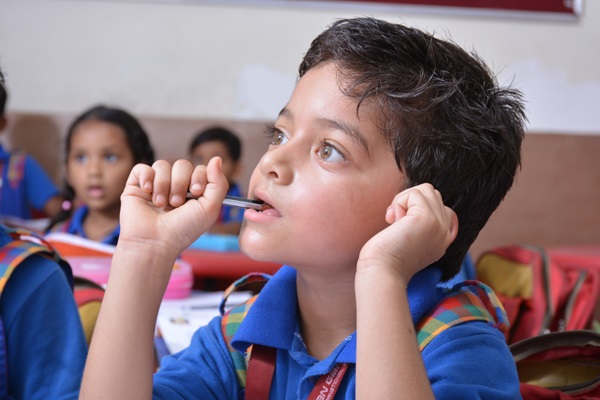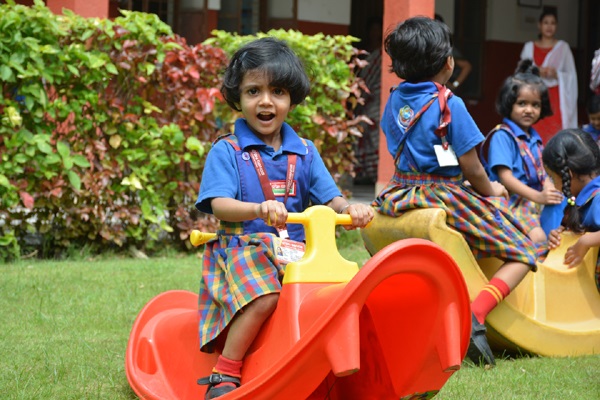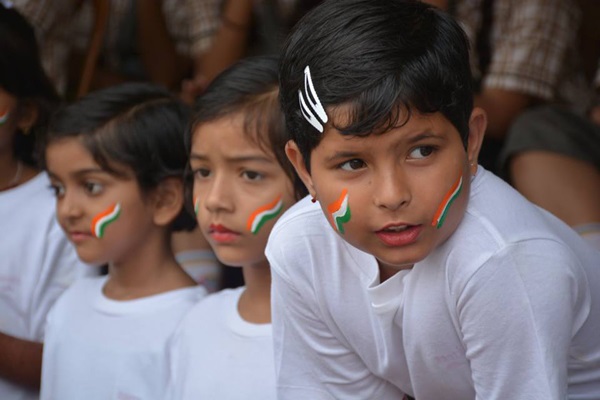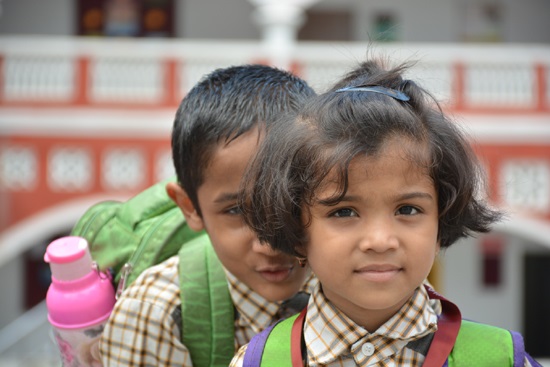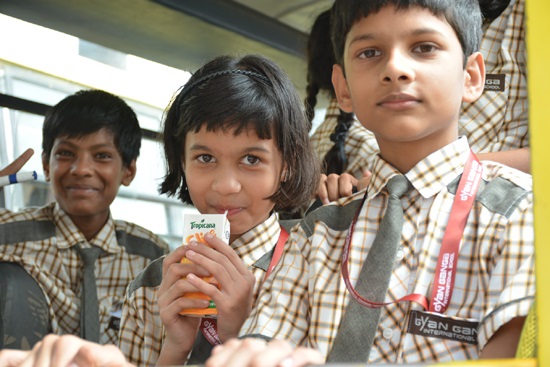Primary & Middle School
Primary school
The Primary School curriculum at GGIOS is fuelled by the natural curiosity that children exhibit at this age. Children share ideas and experiences and develop a sense of community and discipline through interactions with nature, people, objects and the environment. They explore and investigate, consolidate and connect what they learn, ponder over and question it, and then demonstrate their learning in multiple ways. Teachers have many roles too: they are facilitators, learners, guides and mentors.
The classrooms and bulletin boards in one of the top residential schools in India reflect the energy generated at this stage by the students. The displays are an explosion of ideas, creativity and pride, illustrating discoveries in languages, math and science. Insights into concepts are expressed using dance, theatre and movement as well. Each class sets its own rules for expected behavior, guided by a school-wide discipline policy. Responsibilities and expectations are clearly defined by the students themselves.
At the best result School in Madhya Pradesh Education of the highest quality is possible in an environment where students feel valued and respected. At GGIOS the democratic ethos pervades every aspect of interaction with students, parents and mentors. It is in such an environment that our students develop an understanding of not just their strengths but also their weaknesses. This in turn leads to healthy self-respect and increased confidence in their problem-solving abilities.
The Primary School Programme
At the primary level, we follow an Integrated Thematic Curriculum based on NCERT (National Council of Education Research and Training) through CBSE guidelines for Grades 1 - 5/p>
Curricular Practices in Primary School
- Integrated teaching through Themes and Projects: Our integrated curriculum views learning and teaching holistically (rather than as compartmentalized subjects) through meaningful themes and projects that reflect the wider world. This approach prepares children to take responsibility for their learning and become lifelong learners. It also facilitates a sharing of ideas and a strong sense of community because student activities are done in collaborative ways.
- Curriculum based on age-specific learning goals.
- Differentiated learning: Learning plans that cater to at least three levels of learners in a class.
- Small group instruction.
- Individual learning plans: For Special Education Needs students.
- Learning centers: Working towards self-paced learning
- Presentations at the end of themes and projects.
- Assessments: Relevant, formative and continuous, they are based on observations, projects, activities, worksheets, research and presentations, and weekly reviews linked to learning experiences.
- Summative reviews: To check for the end of unit understanding
- Biannual examinations (SA 1 & SA 2) are followed.
- Special activity weeks: Including visual and performing arts, literary activities, math, and science activities.
- 21st Century learning techniques at the best boarding school of India: The use of technology to learn and as an aid to learning all other subjects; digital smart board system.
- Accelerated learning reading programs for Math and English.
- Reading enrichment programme.
- ESL (English as Second Language) programme.
- Circle Time.
- Extended learning opportunities in the form of field trips and workshops.
- Technology integration.
- Weekly student-led assemblies.
- Beyond academics: Co-Curricular activities.
Middle School
The seeds of sound reasoning and the overall development of academic rigor are sown at the primary level. At this next stage between childhood and teenage, a greater ability for abstract thinking begins to emerge in children. The focus on inquiry-based learning continues, as do parallel in-depth explorations of subjects biology, physics and chemistry; algebra, geometry and arithmetic; history, civics, geography; language and literature appreciation; art and music; and sports; which often culminate into integrated projects.
The seeds of sound reasoning and the overall development of academic rigor are sown at the primary level. At this next stage between childhood and teenage, a greater ability for abstract thinking begins to emerge in children. The focus on inquiry-based learning continues, as do parallel in-depth explorations of subjects biology, physics and chemistry; algebra, geometry and arithmetic; history, civics, geography; language and literature appreciation; art and music; and sports; which often culminate into integrated projects. The best boarding school in India shifts from a theme-based approach to a more specialized and focused understanding of concepts in varied disciplines helps students gain insights into their areas of interest. Teachers and students continue to be partners in the learning process as they explore and make connections across subjects, develop critical thinking and apply their knowledge to real-life situations. The acquisition of new knowledge is made more meaningful through opportunities to apply it. Projects, exhibitions, presentations, or field trips ensure that the learner finds many avenues to see the theory in practice.
The Middle School Programme
The Middle School years comprise Grades 6 - 8. Gyan Ganga International School follows a curriculum based on guidelines provided by the CBSE. Greater emphasis is placed on skills of written communication, preparation for broader academic challenges and building independent study skills.
In keeping with our thrust on broadening the horizon of learning, the Middle School program is also tailored to provide students the opportunity to work with the larger community and to develop a sound grounding in ethical values as well as collective social responsibility.
Curricular Practices by the rank 1 school of Jabalpur in the Middle School
- Curriculum based on clearly defined, age-specific outcomes.
- Experiential, inquiry-based approach, balanced by structured academic goals, with due focus on developing the skills of articulation, analysis and application of information.
- Individual Learning Plans: For Special Education Needs students.
- Assessments: Relevant, formative and continuous, they are based on observations, projects, activities, worksheets, research and presentations, and weekly reviews – linked to learning experiences.
- Biannual term exams; SA 1 and SA 2 as per the CBSE rules.
- Weekly testing to follow continuous comprehensive evaluation.
- Subject specific activities and quiz: Language quiz, Science and Math quiz, etc.
- Class Teacher Time: To discuss important issues that influence daily activities and the role of the individual in the wider context.
- Extended learning opportunities in the form of field trips, workshops and guest lectures.
- 21st Century learning techniques: The use of technology to learn and as an aid to learning all other subjects; digital smart board system.
- Weekly student-led assemblies
- Co-Curricular Activities: Sports, art, dance, music and special events both within and outside school.
- Community Outreach Programme: To build awareness and encourage sensitivity.
